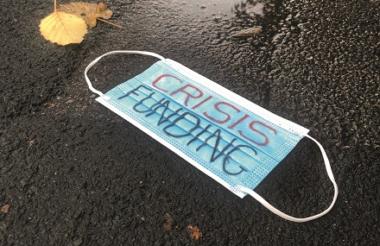A quarter of charities had to draw on their reserves to keep operating during the Covid-19 crisis, according to research released by the Charity Commission.
Larger charities were more likely to have used reserves than small organisations, including a third of charities worth over £500,000.
The data was included in the Commission’s Trustee Research 2021 report, which was published yesterday and polled more than 2,000 charity trustees.
Around four in 10 charities stopped some of its services or activities as a result of the pandemic, while one in seven ceased all activities, the polling found.
Separate research into public trust in charities, also released by the Commission yesterday, showed that trust in the sector had grown to its highest levels since 2014.
Charity finances and services
Some 35% of trustees at charities with annual income of £500,000 or more said that they had been forced to use reserves to continue operating when the pandemic struck.
The proportion was smaller for charities worth between £100,000 and £500,000 (29%) and £10,000 and £100,000 (28%). Only one in seven micro charities, worth under £10,000, said they had used their reserves, although these charities are also more likely not to have any savings.
Over half the larger charities accessed the furlough scheme or other forms of government support, excluding emergency funding, as did a third of charities with incomes between £100,000 and £500,000.
Micro charities were more likely to have ceased activities completely than larger organisations, but also the most likely to have worked during the pandemic without changing their services at all.
A quarter said they had closed all their activities while 20% said they had carried on working as before. Just 3% of the largest charities stopped all their services, but only 17% did not change their services in some way.
Confidence in the Charity Commission
The report also showed rising levels of confidence in some aspects of the Commission’s work.
The proportion of trustees saying they were very confident that wrongdoing at charities “will be dealt with appropriately” by the regulator rose from 46% to 53%, compared with 2020.
The proportion saying that they were very confident that the Commission could uncover wrongdoing was smaller but is also rising, from 19% to 28%.
Ninety-eight per cent of trustees said they were confident or very confident they could protect beneficiaries from harm at their own charities.
Public trust in charities is up
In a separate report, Public Trust in Charities 2021, polling commissioned by the Charity Commission showed that public trust in voluntary organisations is at its highest level since 2014.
The public scored charities 6.4 out of ten on trust and confidence, a small increase on last year and a more significant rise compared with 5.5 in 2018.
Only doctors and the police received higher confidence scores than charities, which are trusted more than banks, social services and newspapers.
Around 60% of the public said that charities are “essential” or “very important” in society, up from 55% last year. This is the first time in ten years that the proportion has gone up.
Reversing a decline
The Charity Commission said that the findings “indicate that a decade-long decline in people’s perception of charities’ importance in society has partially reversed”.
Helen Stephenson, chief executive of the Charity Commission, said: “It is vital that we learn the right lessons from this research.
“The pandemic has been a momentous event in our collective experience, with charities proving their value time and again. But it has not changed people’s fundamental expectations of charity.
“More than ever, people need evidence that charities are not ends in themselves, but vehicles for making the world a better place, both through what they achieve, and the values they live along the way.
“This research also reminds us that while the public shares the same basic expectations of charity, people have different attitudes depending on who they are and where they come from.
“If they are to continue rebuilding trust, charities must recognise and respect this diversity, and engage with a wide range of views and attitudes. I encourage charities to read the research and respond to its findings.”
Related news












